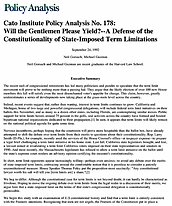The recent rash of congressional retirements has led many politicians and pundits to speculate that the term limit movement will prove to be nothing more than a passing fad. They argue that the likely election of over 100 new House members this fall will satisfy even the most disenchanted voter’s appetite for change. This claim, however, greatly underestimates a series of developments now taking place at the grass-roots level across the country.
Indeed, recent events suggest that, rather than waning, interest in term limits continues to grow. California and Michigan, home of two large and powerful congressional delegations, will include federal term limit initiatives on their ballots this November, and as many as a dozen other states, including Florida, are contemplating similar moves. Public support for term limits hovers around 75 percent in the polls, and activists across the country have formed and funded bipartisan national organizations dedicated to their propagation.[1] In sum, it appears that term limits will likely remain on the national political agenda for quite some time.
Nervous incumbents, perhaps hoping that the courtroom will prove more hospitable than the ballot box, have already attempted to shift the debate over term limits from their merits to questions about their constitutionality. Rep. Larry Smith (D‑Fla.), for example, recently used the services of the House Counsel’s office–at taxpayer expense–to prepare a legal brief challenging a term limit initiative in his home state. Last fall, California state legislators brought, and lost, a lawsuit aimed at invalidating a term limit California voters imposed on their state representatives and senators in 1990. And most recently, the Massachusetts legislature has refused to allow a term limit initiative on the ballot until the state’s supreme court renders an advisory opinion certifying the measure’s constitutionality.
In short, term limit opponents appear increasingly willing–perhaps even anxious–to avoid any debate over the merits of state-imposed term limits, embracing instead the comfortable notion that it is pointless to consider a patently unconstitutional measure. House Speaker Thomas Foley put the proposition most succinctly: “Any constitutional lawyer worth his salt will tell you [term limits are] a sham.”[2]
We beg to differ. Although the constitutional case for term limits is not beyond doubt, it can hardly be characterized as frivolous. Hoping to move the ongoing debate over term limits from the legal realm to a discussion of their merits, we argue here that a state-imposed limit on the terms of that state’s congressional delegation is constitutionally permissible.
We begin this study with an examination of U.S constitutional history and find that a term limit is entirely consistent with the Framers’ intentions. Recognizing that men are not angels, the Framers of the Constitution put in place a number of institutional checks designed to prevent abuse of the enormous powers they had vested in the legislative branch. Bicameralism, frequent elections, staggered terms, differing qualifications, shared and exclusive powers, and state control over election procedures are all examples of the mechanisms the Framers crafted with the hope of ensuring a responsive yet responsible legislature. A term limit, we suggest, is simply an analogous procedure designed to advance much the same substantive end.
Similarly, the text of the Constitution leaves room for term limits. Article I, section 4, explicitly grants the states wide latitude to determine the times, places, and manner of congressional elections. This provision, in our judgment, fully empowers states to enforce term limits on members of their congressional delegations. Moreover, a term limit is harmonious with our constitutional guarantees of free speech or equal protection.
Before proceeding further, however, it would be well to explain exactly what we will defend. Although various term limit proposals have been suggested, we will defend a measure similar to the initiative the voters of Colorado recently approved as an amendment to their state constitution–the only congressional term limit actually enacted to date. Colorado’s amendment limits United States senators and representatives to twelve years in office, allowing them to run again only after a four-year “rotation” out of office.[3] The amendment applies prospectively in that it affects only those congressmen elected after 1990.
We would add one important provision to the Colorado amendment, however: an incumbent would be allowed to conduct a write-in candidacy at any time. Thus, the term limit we defend would remove an incumbent from the printed ballot after twelve consecutive years but leave him the option to run as a write-in candidate.[4]
We defend this slightly amended version of the Colorado term limit, including the number of years permitted, only because it is the first such measure actually to have been approved by a state’s voters. In truth, fewer terms–such as six consecutive years for members of the House, as reflected in most proposals currently before the voters–may be perfectly acceptable. In any case, however, the constitutional issues should not turn on the number of terms a particular measure allows.
About the Authors

This work is licensed under a Creative Commons Attribution-NonCommercial-ShareAlike 4.0 International License.
